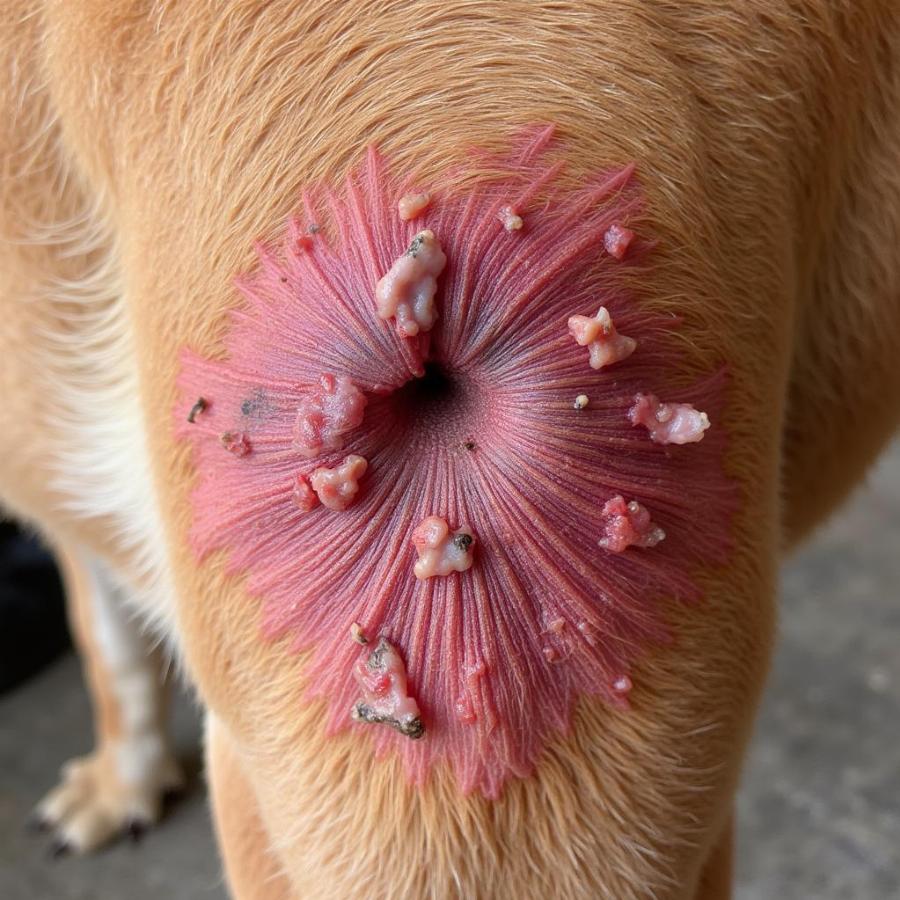Understanding Mange in Dogs
Searching for “pics of mange on dogs” is often the first step pet owners take when they suspect their furry friend might be dealing with this skin condition. While images can be helpful for visual identification, it’s crucial to remember that seeking professional veterinary advice is paramount for accurate diagnosis and treatment.
Mange in dogs is a skin disease caused by microscopic mites. These tiny parasites burrow into the skin of dogs, causing intense itching, hair loss, and skin inflammation. There are different types of mange, each with its own distinct symptoms and treatment protocols. Seeing pictures of mange on dogs can be concerning, but understanding the different types can equip you with the knowledge to act swiftly and effectively.
Demodectic Mange: A Closer Look
Demodectic mange, also known as “demodex” or “red mange,” is caused by the Demodex mite. This type of mange is particularly common in puppies and dogs with weakened immune systems.  Dog with Demodectic Mange While all dogs have small numbers of Demodex mites living harmlessly on their skin, an overgrowth can occur due to immune system deficiencies, leading to the development of this form of mange.
Dog with Demodectic Mange While all dogs have small numbers of Demodex mites living harmlessly on their skin, an overgrowth can occur due to immune system deficiencies, leading to the development of this form of mange.
Sarcoptic Mange: Highly Contagious
Sarcoptic mange, often referred to as “scabies,” is caused by the Sarcoptes scabiei mite. Unlike Demodex mites, Sarcoptes scabiei mites are highly contagious and can spread easily between dogs and even to humans (though the mites don’t live on humans long-term). This type of mange causes intense itching, leading dogs to scratch and chew at their skin relentlessly, often resulting in secondary bacterial infections.
Identifying Mange: Beyond the Pictures
While viewing pics of mange on dogs online can be informative, it’s crucial to remember that accurate diagnosis requires a veterinarian’s expertise. Consulting with your vet is vital if you suspect your dog may have mange. Here’s what your vet will consider:
- Physical examination: Your vet will examine your dog’s skin and coat, looking for signs of mite infestation such as redness, hair loss, scabs, and lesions.
- Skin scraping: In some cases, your vet may take a skin scraping to examine under a microscope. This allows them to identify the specific type of mite present and determine the appropriate treatment.
Effective Mange Treatment
The good news is that mange is treatable. Depending on the type of mange diagnosed, your vet may recommend a combination of treatments:
- Topical medications: Medicated shampoos, dips, or spot-on treatments containing miticides (chemicals that kill mites) are commonly prescribed for both demodectic and sarcoptic mange.
- Oral medications: In some cases, especially for severe or generalized mange, oral medications such as ivermectin may be prescribed.
- Environmental management: Because sarcoptic mange is highly contagious, thorough cleaning and disinfection of your dog’s bedding, toys, and living areas are essential.
Preventing Mange: Proactive Measures
Prevention is always better than cure, and this holds true for mange in dogs. Here are some tips to help keep your furry friend mange-free:
- Regular vet check-ups: Routine veterinary visits allow your vet to detect and address any potential skin issues early on.
- Maintaining a healthy immune system: A balanced diet, regular exercise, and a stress-free environment all contribute to a strong immune system, reducing the risk of demodectic mange.
- Avoiding contact with infected animals: Keep your dog away from other dogs showing signs of skin disease to minimize the risk of sarcoptic mange transmission.
Beaut Dogs: Your Trusted Resource for Dog Care
Beaut Dogs is your one-stop destination for reliable and comprehensive information on all aspects of dog ownership. From breed-specific insights to expert advice on care, we’re here to guide you in providing the best possible life for your canine companion. For personalized assistance and in-depth answers to your dog care questions, contact our team at [email protected]. We’re always happy to help you navigate the wonderful world of dog ownership.